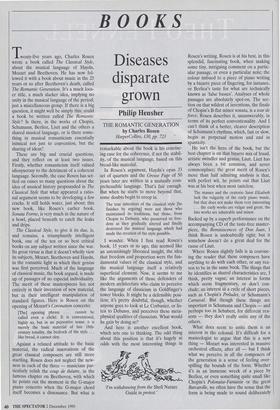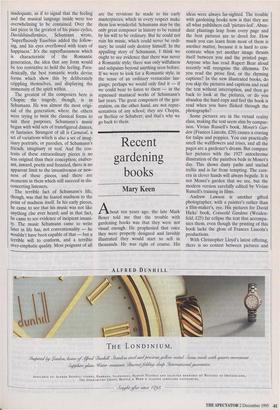BOOKS
Diseases disparate grown
Philip Hensher
THE ROMANTIC GENERATION by Charles Rosen HarperCollins, 130, pp. 723 ' Twenty-five years ago, Charles Rosen wrote a book called The Classical Style, about the musical language of Haydn, Mozart and Beethoven. He has now fol- lowed it with a book about music in the 25 years or so after Beethoven's death, called The Romantic Generation. It's a much loos- er title, a much slacker idea, implying no unity in the musical language of the period; just a miscellaneous group. If there is a big question, it might well be simply this; could a book be written called The Romantic Style? Is there, in the works of Chopin, Schumann, Berlioz, Liszt and the others a shared musical language, or is there some- thing in musical romanticism essentially inimical not just to convention, but the sharing of ideas?
These are big and crucial questions, and they reflect on at least two issues. Firstly, whether romanticism itself valued idiosyncrasy to the detriment of a coherent language. Secondly, the case Rosen has set- tled on raises so many questions about the idea of musical history propounded in The Classical Style that what appeared a ratio- nal argument seems to be developing a few cracks. It still holds water, just about; this new book, like Rosen's earlier book, Sonata Forms, is very much in the nature of a bowl, placed beneath to catch the leaks and drips.
The Classical Style, to give it its due, is, and remains, a triumphantly intelligent book, one of the ten or so best critical books on any subject written since the war. Its great virtue is that it doesn't wholly view its subjects, Mozart, Beethoven and Haydn, in the romantic light in which their genius was first perceived. Much of the language of classical music, the book argued, is made up of passages of no especial individuality. The merit of these masterpieces lies not entirely in their invention of new material, but in their intelligent manipulation of standard figures. Here is Rosen on the opening of Mozart's Coronation concerto;
[The] opening phrase . .. cannot be called even a cliché. It is conventional, highly so, but in no pejorative sense: it is merely the basic material of late 18th- century tonality, the bedrock of the style . . . like bread, it cannot cloy.
Against a relaxed attitude to the basic material, the radical innovations of the great classical composers are still more startling. Rosen does not neglect the new- ness in each of the three — musicians par- ticularly relish the coup de theatre, in the famous chapter on Beethoven, with which he points out the moment in the G-major piano concerto when the G-major chord itself becomes a dissonance. But what is remarkable about the book is his convinc- ing case for the coherence, if not the stabil- ity, of the musical language, based on this bread-like material.
In Rosen's argument, Haydn's opus 33 set of quartets and the Grosse Fuge of 50 years later are written in a mutually com- prehensible language. That's fair enough. But when he starts to move beyond that, some doubts begin to creep in.
The true inheritors of the classical style [he finishes by arguing] were not those who maintained its traditions, but those, from Chopin to Debussy, who preserved its free- dom as they gradually altered and finally destroyed the musical language which had made the creation of the style possible.
I wonder. When I first read Rosen's book, 15 years or so ago, this seemed like an astonishingly liberated insight, the idea that freedom and proportion were the fun- damental values of the classical style, and the musical language itself a relatively superficial element. Now, it seems to me like the arguments of those defenders of modern architecture who claim to perceive the language of classicism in Goldfinger's tower blocks. It might be a defensible posi- tion; it's pretty doubtful, though, whether anyone goes to look at Le Corbusier, or lis- ten to Debussy, and perceives these meta- physical qualities of classicism. What would he gain by doing so?
And here is another excellent book, which sets one to thinking. The odd thing about this position is that it's hugely at odds with the most interesting things in I'm withdrawing from the Shell Nature Guide in protest.' Rosen's writing. Rosen is at his best, in this splendid, fascinating book, when making some tiny, intriguing comment on a partic- ular passage, or even a particular note; the colour imbued to a piece of piano writing by a bizarre piece of fingering, for instance, or Berlioz's taste for what are technically known as 'false basses'. Analyses of whole passages are absolutely spot-on. The sec- tion on that wildest of inventions, the finale of Chopin's B-flat minor sonata, is a tour de force; Rosen describes it, unanswerably, in terms of its perfect conventionality. And I can't think of a better, clearer description of Schumann's rhythms, which, fast or slow, begin as perpetual motion and end in spasticity.
He isn't the hero of the book, but the best chapter is on that bizarre mix of fraud, artistic swindler and genius, Liszt. Liszt has always been a bit common, and never commonplace; the great merit of Rosen's more than half admiring analysis is that, with perfect wit, he points out that Liszt was at his best when most tasteless.
The masses and the oratorio Saint Elizabeth lack the vulgarity of the early piano music, but that does not make them very interesting . . . the early works are vulgar and great; the late works are admirable and minor.
Backed up by a superb performance on the accompanying CD of the taste-free master- piece, the Reminiscences of Don Juan, I think Rosen is undoubtedly right; but it somehow doesn't do a great deal for the cause of Liszt.
Where Rosen slightly fails is in convinc- ing the reader that these composers have anything to do with each other, or any rea- son to be in the same book. The things that he identifies as shared characteristics are, I think, pretty vague; an interest in forms which seem fragmentary, or don't con- clude; an interest in a cycle of short pieces, such as Chopin's Preludes, or Schumann's Carnaval. But though these things are important in Schumann and Chopin — and perhaps too in Schubert, for different rea- sons — they don't really unite any of the others.
What does seem to unite them is an interest in the colossal. It's difficult for a musicologist to argue that this is a new thing — Mozart was interested in massive orchestral effects, after all — but I think what we perceive in all the composers of the generation is a sense of feeling over- spilling the bounds of the form. Whether it's in an immense wreck of a piece by Berlioz, or even something quite small like Chopin's Polonaise-Fantaisie or the great Barcarolle, we often have the sense that the form is being made to sound deliberately inadequate, as if to signal that the feeling and the musical language inside were too overwhelming to be contained. Over the last piece in the greatest of his piano cycles, Davidsbundlertanze, Schumann wrote, `Superfluously Eusebius added the follow- ing, and his eyes overflowed with tears of happiness.' It's the superfluousness which is characteristic of the Romantic generation, the idea that any form would be too restrictive to hold the feeling. Para- doxically, the best romantic works devise forms which show this by deliberately crippling themselves, and displaying the immensity of the spirit within.
The greatest of the composers here is Chopin; the tragedy, though, is in Schumann. He was almost the most origi- nal of the generation; where the others were trying to twist the classical forms to suit their purposes, Schumann's music began with wild sets of transfigured dances, or fantasies. Strangest of all is Carnaval, a set of variations which is also a set of imag- inary portraits, or parodies, of Schumann's friends, imaginary or real. And the con- tents of these extraordinary pieces is no less original than their conception; exuber- ant, inward, poetic and frenzied, there is no apparent limit to the inventiveness or new- ness of these pieces, and there are moments in them which still succeed in dis- concerting listeners.
The terrible fact of Schumann's life, though, was that he feared madness to the point of madness itself, In his early pieces, he came to see that his music was not like anything else ever heard; and in that fact, he came to see evidence of incipient insani- ty. The music Schumann came to write later in life has, not conventionality — he wouldn't have been capable of that — but a terrible will to conform, and a terrible over-emphatic quality. Most poignant of all are the revisions he made to his early masterpieces, which in every respect make them less wonderful. Schumann may be the only great composer in history to be ruined by his will to be ordinary. But he could not ruin his music, which could never be ordi- nary; he could only destroy himself. In the appalling story of Schumann, I think we ought to see evidence that there was never a Romantic style; there was only wilfulness and solipsism beyond anything seen before. If we were to look for a Romantic style, in the sense of an ordinary vernacular lan- guage, perhaps we would only find it — if we could bear to listen to them — in the repressed maniacal works of Schumann's last years. The great composers of the gen- eration, on the other hand, are not repre- sentatives of any school; they are Chopin, or Berlioz or Schubert; and that's why we go back to them.











































































 Previous page
Previous page